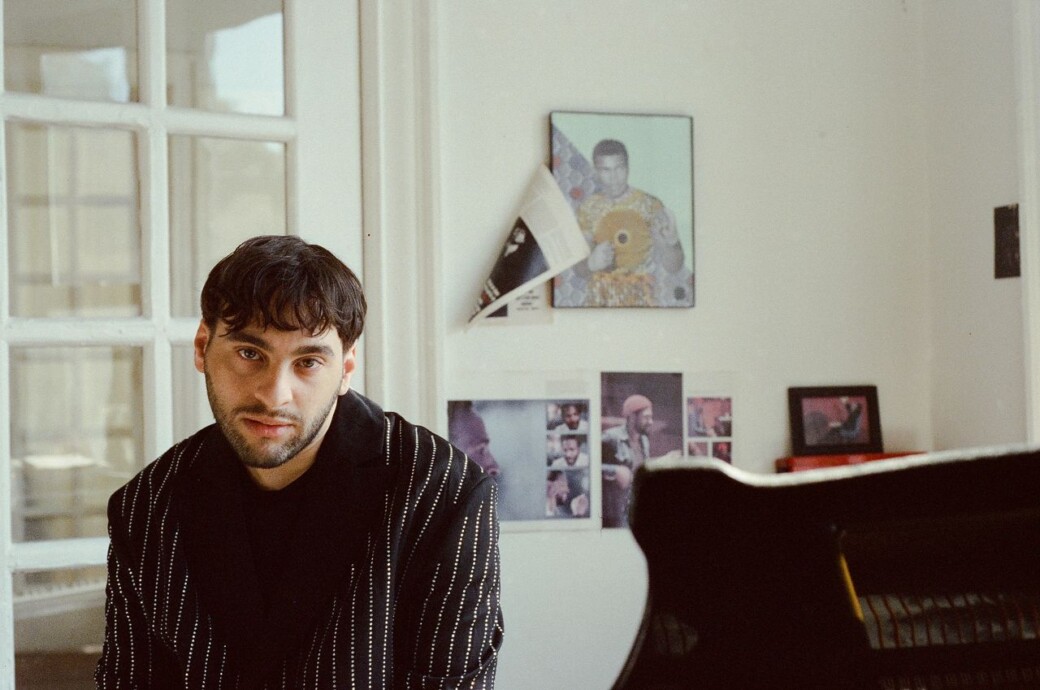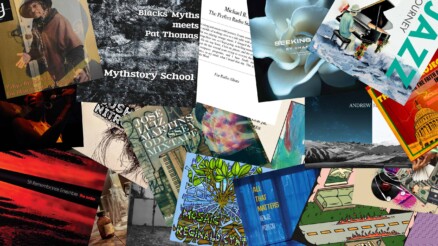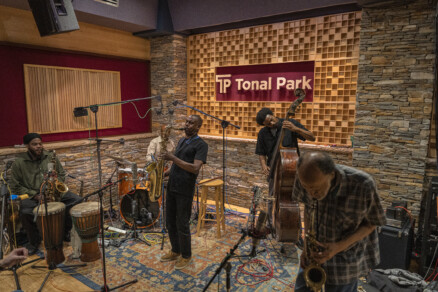‘Can I make this register in your body?’ Samora Pinderhughes on how music can reflect an ethic of care

Samora Pinderhughes has always been tuned in. In 2016 the vocalist and composer released The Transformations Suite, which housed both the poetic and the lyrical within a “jazz” idiom and showed how that idiom could be adept at providing a radical response to the anti-Black violence that defined the era leading into the Black Lives Matter movement. Pinderhughes followed up that project with newer works exploring the same themes, such as his 2020 EP Black Spring. With 2022’s Grief , however, Pinderhughes began to write lyrics that explored the depths of human emotions that also are refracted through the violence of late capitalism.
With his latest release, Venus Smiles Not in the House of Tears, Pinderhughes brings his pen to the exploration of interior relationships. It is a record that examines the ways we see ourselves as human beings and addresses ways of being in a world that increasingly requires us to practice more intentional forms of care.
Pinderhughes was born into an activist-academic-artistic family in the Bay Area. Along with his sister, Elena Pinderhughes, this foundation has allowed him to explore the ways that music shapes new futures and possibilities. The Juilliard graduate is also a prison abolitionist and has mounted large scale multidisciplinary works, such as The Healing Project, which promote the goals of radical movements. In addition to scoring several films, Pinderhughes has received a number of awards and fellowships and is currently at work on a dissertation within the Creative Practice and Critical Inquiry Program, headed by Vijay Iyer, in Harvard University’s Department of Music.
This Thursday, Pinderhughes brings his music to Songbyrd for a rare appearance in the D.C. area. CapitalBop sat down with him to talk about the inspirations behind this work.
CB: I wanted to just ask you about the inspirations for turning inward in this particular moment.
SP: We are all human beings…. Being a human being means that you exist on many registers at the same time. And I think part of the thesis statement of my work in general, even when it comes to the most political work I do … is just that I believe very deeply that every single human being contains everything within them. I don’t think there are people that are good and people that are bad. Or people that are saints and people that are sinners. I don’t subscribe to that. I think we all are human beings that contain so much. And the combination of spirit, environment, history, and choice are what informs the ways that we operate in the world and creates those differences between the things that we do in the world. I think that because of that, ethics [matter in how] we want to operate as political beings, or social beings, or people building a world that we hope to see.
We have to figure out how to operate that way on a day-to-day basis with ourselves and with our communities on every level. And I think that what that requires is that we learn to live within the gray. What I mean by that is there’s never any moment in which you solve yourself. It doesn’t mean that there’s something wrong with you, and you shouldn’t double down with “oh, I failed.” You just have to keep working at it and figure out how to build those relationships with self that allow you to treat other people well. Because the only way you can do that is if you’re not in your own way.
That’s how this album operates.
It’s very intentional that it starts with the solitary voice in relationship to other solitary voices and ends with the collective voice. Because how I think about the work is that there’s the work of dealing with yourself and finding the tools that you need to investigate and support and scaffold your personal things that affect you. Then there’s the ways that this interacts with community. Both the ways that you hold others and the ways that you are held in community. I think that’s what the album hopefully does.
CB: It does. I’m interested in hearing how study informs your practice and your writing?
SP: It’s everything. That’s why I’m also trying to commit to scholarship as well. Honestly, most of my study exists outside of the academy. I really believe in craft. I really believe in the archive. I think part of the human purpose is to learn. And I think it’s a really underrated quality right now, because I think that as a society, we’re being very intentionally stripped of the value of that practice. I think that the primary value of information is that we become better human beings, we become more informed human beings.
Venus Smiles Not in the House of Tears is informed by all these musical influences, [but] it is very informed [also] by the work of Kiese Laymon, Robert Jones, Jr., Imani Perry, Ocean Vuong, Sarah Kay [and] Hanif [Abdurraqib] – all contemporary writers. Also, Ashon Crawley, Shana Redmond, who really inform, not just the narrative choice, but the musical choices that I make, and how I understand the purpose of music. I’ve learned just as much, if not more, about why I should be making music from Shana Redmond and Robin Kelley than I have from Bjork.
CB: Can you elaborate on that? Because I’m interested in not just the why, but also at the level of the sonic, at the level of what goes into the choices that are made sonically and the relationship to these ideas. For instance, the way that Kelley talks about dreaming, or the way that Redmond writes about all the things music does.
SP: I’m currently in the middle of working on my dissertation, which is going to be on abolition and sound. I’m thinking deeply about this in multiple ways. And just the first example that comes to mind actually has to do with both Katherine McKittrick and Kevin Quashie’s work around visuality, and Black death — how the realities of the oppression of Black people have been depicted and engaged with and through by the populace.
The effectiveness of what I would call the spectacular and the violent is just not what it was before. I’m very committed to doing the opposite of that in my sonic practice. And what I really believe in is that through beauty as a principle, through duration, through the details of vulnerability, we can engage with Black life and Black living as a counterpoint to how often people engage with Black death.
I think it’s also about the ability that we have to engage with care. The same way that we are conditioned to engage with spectacular violence in the visual medium is the same way that I think we’re conditioned to operate on a political level where we only react when the worst version of something happens, instead of actually being present on the everyday level with things that are happening to people all the time.
`I think about applying those principles to my work sonically. I try to evidence that as much as I can. Reading Robin’s work is what allowed me to find my place as an avant-garde surrealist artist. The principles that make me avant-garde are not necessarily super experimental sonic choices as much as they are the way that I approach emotion. The question I have — rather than, “Can I surprise you with a sound that you haven’t heard before?” — is, “Can I make this register in your body in a way that it hasn’t before?” So that’s my version of the avant-garde.
CB: I just want to ask you a little bit about the spirit of collaboration that shows up in Venus. What are you trying to signal by having these kinds of large ensembles play alongside you?
SP: If I’m being honest, I would say the large ensemble piece is probably the least intentional element of all the things we’re talking about. I didn’t plan that. That is community. These are all the homies, and they’re all the best. I guess it comes out of vulnerability. I surround myself with people that are better than me, that bring elements that I can’t bring, people that inspire me. It’s the combination of really believing in that collaborative process to make the work the best it can be. That’s another thing that people feel on stage. It’s like, “Wow, we can feel the love that you have for each other while you’re performing.” And that’s a real honest thing.
CB: And working with Jack DeBoe?
SP: Jack and I have been working on this music together for seven or eight years. That’s the case with a lot of people that I work with. Because we’ve been working together for a long time, Jack has evidenced trust in the vision of the work and put a lot into it. There’s literally no Venus without Jack. Venus was originally a band. That was Jack; the bassist Joshua Crumbly; Gabe Schneider, who plays a lot of the guitars on the album; [and] my sister Elena, [who I] collaborate [with] all the time.
Jack [and I] were just consistently chipping away at these arrangements for a long time. Jack’s gift is that he’s truly a servant to the music. He’s not thinking, “Let me make these production choices that are gonna make people think, ‘This goes crazy.’” He’s really like, “What is the lyric trying to say right now, what is this song really needing to do? How does it need to register in the body? What story is it trying to tell?”
DC, DC jazz, jazz, Robin Kelley, Samora Pinderhughes, Shana Redmond, Songbyrd, Washington


